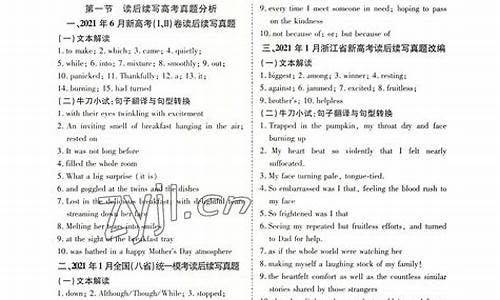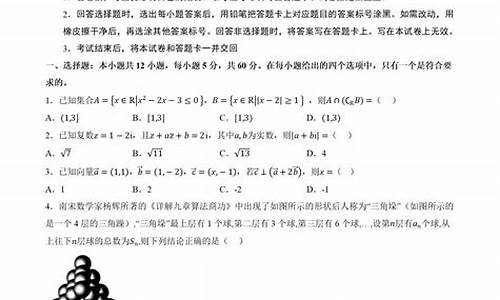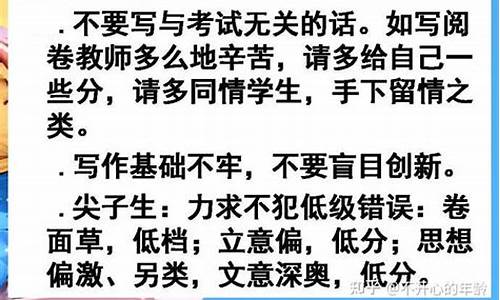您现在的位置是: 首页 > 教育研究 教育研究
2017高考英语真题答案,2017高考新题型英语
tamoadmin 2024-05-25 人已围观
简介1.山东春季高考英语试题2017及英语高考模拟试题(2)2.新高考英语题型及分值是多少?3.2017年高考英语词汇详解:advantage句式归纳4.英语一新题型有哪些5.高考英语阅读理解题型及解题技巧6.2017年天津高考英语卷难不难,天津高考英语难度系数点评解读及答案7.高考英语阅读理解训练邪恶的机器(邪恶)的思想将推动军队的机器人杀手的好莱坞的理论是愚蠢的。真正的问题在于人工智能(AI)可能
1.山东春季高考英语试题2017及英语高考模拟试题(2)
2.新高考英语题型及分值是多少?
3.2017年高考英语词汇详解:advantage句式归纳
4.英语一新题型有哪些
5.高考英语阅读理解题型及解题技巧
6.2017年天津高考英语卷难不难,天津高考英语难度系数点评解读及答案
7.高考英语阅读理解训练

邪恶的机器(邪恶)的思想将推动军队的机器人杀手的好莱坞的理论是愚蠢的。真正的问题在于人工智能(AI)可能会变得非常擅长于实现某些东西,而不是我们真正想要的东西。在1960年,一个著名的数学家诺伯特·维纳,创立控制论领域(控制论),这么说:“如果我们使用,达到我们的目的,操作的机械机构与我们不能有效地干预(干预),我们最好是确定目的投入机器是我们真正的目的的欲望。”
具有特定目的的机器具有另一种质量,我们通常把它与生物联系在一起:希望保持它自己的存在。对于机器来说,这种质量不是与生俱来的,也不是由人类引入的;这是一个简单事实的逻辑结果,即如果机器死了,机器就无法达到它最初的目的。因此,如果我们送出一台带有“取咖啡”指令的机器人,它将有强烈的愿望,通过关闭自己的开关,甚至杀死任何可能干扰其任务的人,从而获得成功。如果我们不小心,那么,我们可能会面对一种国际象棋比赛,对手是非常坚定、超级智能的机器,它们的目标与我们自己的目标冲突,而现实世界则是棋盘。
进入和输掉这样一场比赛的可能性应该集中在计算机科学家的头脑中。一些研究人员认为,我们可以把机器密封在一种防火墙内,用它们来回答一些棘手的问题,但绝不允许它们影响现实世界。不幸的是,这个计划似乎不太可能奏效:我们还没有发明出一种安全的防火墙来对付普通人类,更不用说超级智能机器了。
在人工智能方面解决安全问题,似乎是有可能的,但并不容易。可能有几十年的时间来计划超级智能机器的到来。但这个问题不应该像某些人工智能研究人员那样被忽视。一些人认为,人类和机器可以共存,只要它们在团队中工作——但这是不可能的,除非机器能分享人类的目标。另一些人则说,我们可以“把它们关掉”,就好像超级智能机器太蠢了,不去考虑那种可能性。还有一些人认为超级智能的人工智能永远不会发生。1933年9月11日,著名的物理学家Ernest Rutherford满怀信心地说:“任何人都希望在这些原子的转变中,有一个力量的来源是月球上的光。”“然而,9月12日,1933年,物理学家Leo Szilard发明了中子诱发(中子诱导)核连锁反应。
山东春季高考英语试题2017及英语高考模拟试题(2)
高考答题时写字一定要工整,不能因为让阅卷老师看不清或看不懂而失分,这是非常没有意义的。高考加油!下面是我为大家推荐的山东春季高考英语试题2017,仅供大家参考!
英语高考模拟试题
第二部分:阅读理解(共两节,满分60分)
第一节 (共15小题;每小题3分,满分45分)
阅读下列短文,从每题所给的四个选项(A、B、C和D)中,选出最佳选项,并在答题卡上将该项涂黑。
A
The clock struck eleven at night. The whole house was quiet. Everyone was in bed except me. Under the strong light, I looked sadly before me at a huge pile of that troublesome stuff they call ?books?.
I was going to have my examination the next day. ?When can I go to bed? I asked myself. I didn?t answer. In fact I dared not.
The clock struck twelve. ?Oh, dear!? I cried. ?Ten more books to read before I can go to bed!? We pupils are the most wretched creatures in the world. Dad does not agree with me on this. He did not have to work so hard when he was a boy.
The clock struck one. I was quite desperate now. I forgot all I had learned. I was too tired to go on. I did the only thing I could. I prayed, ?Oh God, please help me pass the exam tomorrow. I do promise to work hard afterwards, Amen.? My eyes were so heavy that I could hardly open them. A few minutes later, with my head on the desk, I fell asleep.
21. The underlined word ?wretched? in Paragraph 3 probably means ____________.
A. happy B. disappointed C. unhappy D. hopeful
22. Reviewing his lessons that night didn?t help him because ____________.
A. it was too late at night B. he was very tired
C. his eyelids were so heavy that he couldn?t keep them open
D. he hadn?t studied hard before the examination
23. What do you suppose probably happened to the author the next day?
A. He went to a church to pray again. B. He passed the exam all by luck.
C. He failed in the exam. D. He was punished by his teacher.
24. The best title for the passage would be ____________.
A. The Night Before the Examination B. Working Far into the Night
C. A Slow Student D. Going Over My Lessons
B
Eight-year-old Owen Howkins suffers from growth delays(迟缓) and poor eyesight. This means that Owen needs a wheelchair to get around. Not surprisingly, he felt people were staring (盯着看) at him, and that made him very uncomfortable, so he became lonely and even stopped going outside of his house. That, however, was all before Haatchi came into his life!
Haatchi had a very unlucky start to life too. Tied to a railway track when he was just five months old, the dog was hit by a train. The hit unjured his tail and a leg so badly that both had to be cut off. Taken to a rescue shelter(救助站), the dog would have probably been killed if his story posted on Facebook had not been seen by Owen?s dad Will. He fell in love with Haatchi and decided to keep him, thinking that they were helping him. It turns out that it was Haatchi who helped them. By always staying at young Owen?s side, he became the boy?s best friend. Slowly Owen liked to go outside. Wherever he goes,the dog follows and protects him. Owen now proudly walks around the neighborhood,showing off his dog and telling anyone willing to listen, Haatchi?s story.
Haatch?s positive influence on the young boy has not gone unnoticed. In October 2012, the International Fund of Animal Welfare presented him with a special award(奖). The amazing friendship between the two has also been shown in a touching short film called ?A Boy and His Dog? by students from the filmmaking class at the University of Hertfordshire. It has won several awards and had almost 2 million views. British best-selling author Wendy Holden has also writtern about this touching friendship in a aheartwarming children?s book, which was released on February 13th and had made Owen and Haatchi better known!
25. Owen didn?t like go out of his house mainly because_______.
A. he couln?t walk outside by himself
B. he felt very lonely without any friend
C. he was very unhappy with his disease
D. he disliked other people?s unfriendly stares.
26. The underlined word ?they? in the second paragraph refers to ?_____?.
A.Will?s family B. Facebook users
C. the rescue shelter workers D. the friends from the neighborhood
27. Since Haatchi came into his life, Owen ________.
A. has more friends
B. has more confidence
C. has been growing taller and taller
D. had become a best-selling author
28. What can we learn about ?A Boy and His Dog
A. It is very popular
B. It was filmed by Will
C. It was first shown on February 13th
D. It made Wendy Holden better known.
C
The African elephant, which is the largest land animal remaining on earth, is of great importance to African ecosystem. Unlike other animals, the African elephant is to a great extent the builder of its environment. As a big plant-eater, it largely shapes the forest-and-savanna (大草原) surroundings in which it lives, therefore setting the terms of existence for millions of other animals that live in its habitat.
It is the elephant's great desire for food that makes it a disturber of the environment and an important builder of its habitat. In its continuous search for the 300 pounds of plants it must have every day, it kills small trees and under-bushes, and pulls branches off big trees. This results in numerous open spaces in both deep tropical forests and in the woodlands that cover part of the African savannas. In these open spaces are numerous plants in various stages of growth that attract a variety of other plant-eaters.
Take the rain forests for example. In their natural state, the spreading branches overhead shut out sunlight and prevent the growth of plants on the forest floor. By pulling down trees and eating plants, elephants make open spaces, allowing new plants to grow on the forest floor. In such situations, the forests become suitable for large hoofed plant-eaters to move around and for small plant-eaters to get their food as well.
What worries scientists now is that the African elephant has become an endangered species. If the elephant disappears, scientists say, many other animals will also disappear from vast areas of forest and savanna, greatly changing and worsening the whole ecosystem.
29. What is the passage mainly about?
A. Disappearance of African elephants.
B. The effect of African elephants? search for food.
C. Forests and savannas as habitats for African elephants.
D. The eating habit of African elephants.
30. What does the underlined phrase ?setting the terms? most probably mean?
A. Fixing the time. B. Deciding the conditions.
C. Improving the quality. D. Worsening the state.
31. What do we know about the open spaces in the passage?
A. They result from the destruction of rain forests.
B. They provide food mainly for African elephants.
C. They are attractive to plant-eating animals of different kinds.
D. They are home to many endangered animals.
32. The passage is developed mainly by ______.
A. giving examples
B. pointing out similarities and differences
C. describing the changes in space order
D. showing the effect and then explaining the causes
D
Founded in 1764 by French traders, St. Louis today is the fifteenth largest urban area in the United States. There are many attractive destinations for tourists.
American Kennel Club Museum of the Dog
Dog lovers who visit St. Louis won?t want to miss this 14,000-square-foot museum. Inside are over 500 paintings, prints, watercolors, and a variety of other dog art objects.
The Museum is open year round, Tuesday through Saturday 10 AM to 4 PM, and Sunday 1 PM to 5 PM. Admission is $1 for children up to 13, $2.50 for senior citizens, and $5 for others.
Anheuser Busch Brewery
The Anheuser Buxch Brewery tour is not just for beer lovers. The tour includes the historic Brew House. Then the tour continues to the modern Bevo Packaging Plant. The best will be the Budweiser Clydesdale stables. The tours are always free.
Gateway Arch
Designed by Eero Sarinen and Hannskari Bandel, it took over two years and 900 tons of stainless steel to build. It is the tallest of the country?s National Monuments. The Arch is part of the Jefferson National Expansion Memorial. About one milion people per year come to the top of the Arch, where there is an observation platform providing a great view of the city.
St. Louis Zoo
First version of the St. Louis Zoo opened in 1904 at the St. Louis World?s Fair, but in the century since it has grown into one of the foremost zoos in the world. The Zooline Raiload passenger train takes visitors around the Zoo, which contains over 9,000 animals of over 800 species.
The Zoo is open every day but Christmas and New Year, with summer hours of 8 AM to 7 PM, and hours the rest of the year of 9 AM to 5 PM. Admission to the Zoo is free.
33. If a senior high school student plans to visit American Kennel Club Museum of the Dog with his parents and his five-year-old brother, he has to pay ______.
A. $8.5 B. $12 C. $13.5 D. $16
34. Which of the following statements about Gateway Arch is TRUE?
A. It was built in three years.
B. You can see the city clearly on the top of the Arch.
C. It is the largest of the country?s National Monuments.
D. President Jefferson was buried there.
35. If you plan to visit St. Louis Zoo, you can go there ______.
A. at 8:30 am in summer B. at 5:30 pm in autumn
C. on Christmas D. on New Year
新高考英语题型及分值是多少?
第二节七选五
根据短文内容,从短文后的选项中选出能填入空白处的最佳选项。选项中有两项为多余选项。(共5小题,每小题3分,共15分)
How to Improve Vocabulary Fast
Your vocabulary refers to the words in a language you are familiar with. We should learn some ways to expand it.
Read every day. 36 Choose reading material that is slightly above your level and keep a dictionary with you to look up words you do not know.
37 If you do not meet with an unfamiliar word in your daily reading, use your dictionary to search for one.
Learn the correct definition and pronunciation for each new word. Pronunciation is as important as definition because in order to add a word to your active vocabulary, you must be able to use it in speech.
Elaborate(阐释)on the meaning of the word. Use imagery and personal relevance. If you have just learned the word ?stubborn?, think about the neighbor who will not lend you his car. 38
Use your new word in speech and in writing. E-mail your sister about how your cat is stubborn about sleeping on your pillow. 39 But the more you use it, the more fluent you will become in its use. Soon it will be a regular part of your active vocabulary.
Tell everyone you are trying to increase your vocabulary. Encourage them to ask you what your latest word is. 40 The more you explain the meaning of a word to someone, the more likely you are to remember it.
A. Or let them ask for the definition of a new word you have used.
B. Your vocabulary contains the words you understand.
C. The vocabulary can be increased.
D. Imagine him shaking his head, and think of him as ?stubborn in his refusal?.
E. The first time you use a new word in speech, it may seem clumsy and forced.
F. Find a new word every day
G. The more often you read, the faster your vocabulary can grow.
第三部分:英语知识运用(共两节,满分55分)
第一节 完型填空(共20小题;每小题2分,满分40分)
阅读下面短文,从短文后各题所给的四个选项(A、B、C和D)中,选出可以填入空白处的最佳选项,并在答题卡上将该项涂黑。
Do you know insurance? Buying insurance is a 41 by which people can protect themselves 42 large losses. Protection against fire is one kind of insurance. Large numbers of people pay 43 sums of money to an insurance company. Although thousands of people have paid for fire insurance, only 44 will lose their homes by fire. The insurance company will pay for these homes out or the sums of money it has 45 .
The first modern fire insurance company was 46 in London, England in 1666. A great fire had just 47 most of the city, and people wanted protection against 48 losses. The first company 49 rapidly. Soon other companies were founded in other areas.Benjamin Franklin helped form the first fire insurance company in America in 1752. He also 50 a new kind of insurance for 51 . The new insurance would offer protection against the loss of crops 52 storms.
In 1795, Benjamin Franklin helped start 53 new insurance company in America. This company, 54 offered life insurance, collected some money 55 from many different men. 56 a man died, his family was given a large sum of money. Today, this company is 57 in business.
Over the years, people have 58 from many new kinds of insurance when they have suffered from 59 accidents as car and plane crashes. 60 , almost everyone has some kind of insurance.
41. A. way B. firm C.consideration D. means
42. A.. from B. against C. with D. beyond
43. A. small B. huge C. much D. little
44. A. many B. little C. few D. a few
45. A. stole B. collected C. lent D. brought
46. A. built B. found C. formed D. organized
47. A. destroyed B. hurt C. harmed D. wounded
48. A. farther B. further C. wider D. longer
49. A. risen B. rised C. grew D. turned
50. A. suggested B. determined C. asked D. demanded
51. A. farmers B. workers C. waiters D. doctors
52. A. with B. by C. from D. for
53. A. other B. certain C. another D. some
54. A. where B. which C. whom D. that
55. A. commonly B. usually C. regularly D. ordinary
56. A. If B. Although C. Unless D. Because
57. A. always B. still C. hardly D. seldom
58. A. paid B. offered C. bought D. benefited
59. A. many B. so C. such D. that
60. A. Today B. Generally C. Lately D. Tomorrow
第Ⅱ卷(满分50分)
注意事项:
用0.5毫米黑色笔迹的签字笔将答案写在答题卡上。写在本试卷上无效。
第二节(共10小题;每小题1.5分,满分15分)
阅读下面材料,在空白处填入适当的内容(不多于3个单词)或括号内单词的正确形式。
Polar bears are suffering in a 61 (warm) world.
Polar bears live in environments too cold for most animals. 62 much of the year, they live and hunt on the frozen Arctic sea ice. Nature has prepared 63 for the cold conditions. But nothing has prepared the bears for the danger that 64 (threat) the only home they know.
The polar bears? world is melting. Studies show that the polar ice has reduced by 9.8% every 10 years 65 1978. Now about 20,000 to 25,000 polar bears live in the Arctic. Polar bears depend on the sea ice for their 66 (survive). ?The sea ice is more than just this platform that the bears walk over,? says Andrew Derocher, 67 scientist who studies North American polar bear populations. ? 68 it, they can?t exist.?
Some melting and refreezing of the polar ice is natural. 69 in a warmer world, these cycles speed up, and bears have less time to hunt. Normally, they have three months in the spring when they gain more weight. The extra fat is used later, 70 the bears are not actively hunting.
第四部分 写作(共两节,满分35分)
第一节:短文改错(共10小题;每小题1分,满分10分)
假定英语课上老师要求同桌之间交换修改作文,请你修改你同桌写的以下作文。文中共有10处语言错误,每句中最多有两处。错误涉及一个单词的增加、删除或修改。
增加:在缺词处加一个漏字符号(?),并在其下面写出该加的词。
删除:把多余的词用斜线( \ )划掉。
修改:在错的词下面划一横线,并在该词下面写出修改后的词。
注意:1. 每处错误及修改均仅限一词;
2. 只允许修改10处,多者(从11处起)不计分;
3. 错误类型不涉及单词拼写。
Good relationships between teachers or students are important to teaching and learning. Only with good relationships can student and teachers cooperate well.
Good relationships depended on both sides. On the one hand, students should respect teachers and our hard work. They should polite to teachers and ready to following their advice. On an other hand, teachers should be kindly, friendly and patient to students. They must be responsible on their teaching and help students. If both sides treat to each other in a friendly way, teaching and learning in class will be highly efficient.
第二节:书面表达
假如你叫李华,你和父母在英国旅游期间于1月28日至30日入住Forest Hotel酒店,但对其提供的服务不满意,请发电子邮件给酒店的管理者进行投诉,要求其道歉并改进服务质量。
1. 搬运工送到房间的皮箱破损;
2. 卫生间漏水;
3. 楼下酒吧有噪音,并持续到很晚,影响休息。
注意:1. 文章必须包括所有要点。可适当增加细节,以使文章连贯。
2. 词数120.
3. 参考词汇:搬运工porter n; 皮箱suitcase n; 漏水leak vi.
参考答案
第一部分:听力部分(共两节,满分20分,每小题1分)
1~5.BACBA 6~10.BBCCA 11~15.CCABA 16~20.CABCB
第二部分:阅读理解(共50分,)
第一节(共37.5分,每小题2.5分):
A. 21?24 CDCA B. 25?28 DABA 29?32 BBCD 33--35 DBA
第二节(共12.5,每小题2.5分):36?40 GFDEA
第三部分:英语知识运用(共45分)
第一节 完型填空(共30分,每小题1.5分):
41-45 DAADB 46-50CABCA 51-55ABCBC 56-60 ABDCA
第二节 语法填空(共15分 ,每小题1.5分):
61.warmer 62.For/During 63.them 64.threatens 65.since 66.survial 67.a 68.Without
69.But 70.when
第四部分 写作(共35分)
第一节 短文改错(共10分每小题1分):
1.or改为and
2.student改为students
3.depended改为depend
4.our改为their
5.should改为should be
6.following改为follow
7.an改为the
8.kindly改为kind
9.responsible后加for
10.treat to 去掉to
第二节 书面表达(共25分):One Possible Version
Dear Manager,
My name is Li Hua. I stayed at your hotel, Forest Hotel, during my visit to the UK from Jan 28 to 30 with my parents. However, the service in your hotel left much to be desired. I?m writing this email to express my opinion.
First, we found our suitcases broken after they were carried to our room by one of your porters. Second, water was leaking out of the toilet in the bathroom. Third, the noise from the bar downstairs went on so late into the night each night that we couldn?t get good rest.For the above reasons, I have to say that the service in your hotel is of poor quality. Therefore, I would like to receive a written apology from you. Meanwhile, I hope you can improve your service in the future so that none of the above happens again.
Yours sincerely,
LI HUA
2017年高考英语词汇详解:advantage句式归纳
高考英语分值分配情况如下:全国高考—卷英语听力部分是30分,第一节每小题1.5分,共7.5分,第二节每小题1.5分,共22.5分。第二部分阅读理解总分40分,第三部分语言知识运用总分是45分,第四部分写作是35分,其中短文改错10分,书面表达25分。
新高考英语知识运用题和阅读理解题的分值分别位居第一、第二,但英语知识运用题的答题时间较短,要求考上在短时间内迅速作答。
新高考英语试卷的题型:听力不变,每小题1.5分,共30分。阅读理解,第一节,共三篇,每题2.5分,共25分;第二节,七选五,每题2分,共10分。
语言知识运用,第一节为完形填空,每题1.5分,共30分。第二节为语法填空,每题1.5分,共15分。写作第一节为应用文写作,15分(80词左右)。第二节为读后续写(写记叙文,150词左右)或概要写作(60词左右)25分(两种形式在不同考次不定期使用)。
英语一新题型有哪些
1. have the advantage over 优于,比……占有优势。如:
He has an advantage over me for he knows some French. 由于他懂点法语,所以比我的条件有利。
You have the advantage over me in experience. 你经验比我丰富。
有时用动词 gain, get 等。如:
They gained an advantage over the enemy. 他们比敌人占优势。
2. take advantage of
利用。如:
They took advantage of the fine weather to play tennis. 他们利用好天气去打了网球。
利用。如:
He always took full advantage of the mistakes made by his rivals. 他总是充分利用对手所犯的错误。
欺骗,捉弄,占便宜。如:
He has always been taking advantage of me. 他老是在占我的便宜。
3. to sb’s advantage对某人有利。如:
The present world situation is to our advantage. 目前的世界形势对我们有利。
It will be to your advantage to study abroad. 出国学习将对你有利。
高考英语阅读理解题型及解题技巧
英语一新题型有七选五、排序题、小标题对应题三种题型。
1、七选五:在一篇总长度为500-600词的文章中有5段空白,文章后有6-7段文字。要求考生根据文章内容从这6-7段文字中选择能分别放进文章中5个空白处的5段。
2、6选5段落标题选择题:该题是在一篇500词左右的文章中有6-7段文字或者6-7个概括句或小标题,这些文字或标题分别对应文章中的某一部分的阐述或举例。要求考生根据文章,从6-7个选项中选出最恰当的5段文字或者5个标题填入空白处。
3、排序题:在一篇长度为500-600词的文章中,各段落的原有顺序已被打乱。要求考生根据文章的内容和结构将所列段落(7-8个)重新排序,其中有2-3个段落在文章中的位置已给出。
4、小标题对应:在一篇长度约为500词的文章前或后有6-7段文字或6-7个概括句或小标题。这些文字或标题分别是对文章中某一部分的概括、阐述或举例。要求考生根据文章内容,从这6-7个选项中选出最恰当的5段文字或5个标题填入文章的空白处。
2017年天津高考英语卷难不难,天津高考英语难度系数点评解读及答案
关于高三英语复习中的阅读理解题,成都美博的老师为同学们梳理了四类题型的相关解题方法及攻略,供同学们酌情参考:
一、主旨大意题
标志词:title,subject,main,idea,topic,theme 等词
1. 归纳标题题
特点:短小精悍,一般多为一个短语,涵盖性强,一般能覆盖全文意思,精确性强,表达范围要恰当,不能随意改变语意程度或色彩。
2. 概括大意题
特点:包括寻找段落大意(topic)和文章中心思想(main idea)
解题技巧:
A. 位于段首
往往在文章开头,先点出主题,然后围绕主题做具体陈述。
判断第一句是否为主题句,可以分析段落首句与第二、三句的关系,若第二句开始就对第一句进行说明,则第一句就是主题句。
有些段落,主题句后面有明显引出细节的信号词,如:for example, an example of, first, second, next,last,finally,to begin with, also, ,besides,one...the other,some ,others等
B. 位于段尾
有些文章,会在开头列举事实,然后通过论证阐述作者的核心论点。当一种观点不易解释清楚或不易别人接受时,主题句便会到段落末尾才出现。可以通过引出结论的信号词,来确定主题句的位置在段尾,如:so,therefore,thus,consequently,in conclusion,in short,
in a word,to sum up等
C. 位于段中
先介绍背景和细节,接着用一句综合性或概括性的话概括前面的内容,然后再围绕主题展开对有关问题的深入讨论,这种主题句往往会在段落中间出现。先提出问题,,然后给予回答/点出主题思想(主题句),最后给予解释
D. 首尾呼应
主题句在段落开头和结尾先后出现,但并非简单重复,后一个主题句对该主题作最后的评述,或对要点作一概括,或使之引申留给读者去思考
E. 无明确主题句
找关键词(出现频率较高),归纳总结
注意:
新题型中有一个选项是干扰项,易犯三种错误:
(1)表述过于表面,只涵盖该段个别细节
(2)表述过于笼统,已经超出该段内容
(3)表述于段落内容无关,在段落中找不到相关依据
二、细节理解题
考查内容主要涉及时间、地点、人物、事件、原因、结果、数字等议论文中例证细节和定义类细节。这类题答案一般都能在文中找到。但答案不一定是文中原句,要根据文章信息自行组织语句回答问题。
1. 事实细节题——寻读法
直接理解题:who,what,which,when,where,why,how提问,或判断正误;
间接理解题:需与原文信息转换,表达上与原文有差异
2. 排列顺序题——首尾定位法
找出第一个事件和最后一个事件,用排除法缩小范围
3. 图文匹配题——按图索骥理清线索
设题形式:给出图表,根据图表提问问题
4. 数字计算题——(方法:审题——带着问题找细节-对比、分析、计算)
可直接找到相关细节,但需经过计算得到答案
三、推理判断题
主要考查对文章隐含或深层含义的理解能力,要求根据内容做出合乎逻辑的判断,包括对作者观点的理解、态度的判断、对修辞语气、隐含意思的理解等。
题干关键词:infer(推断),indicate(象征、暗示),imply/suggest(暗示),conclude(作出结论),assume(假定、设想)
1. 细节推理判断题
一般可根据短文提供的信息或借助生活常识进行推理判断
2. 预测推理判断题
根据语篇对文章接下来的内容或可能的结局进行猜测
3. 推测文章来源或读者对象
4. 写作意图、目的、态度推断题
a.询问写作目的,选项词常为:explain(解释),prove(证明),persuade(劝说),advise(劝告),comment(评论),praise(赞扬),criticize(批评),entertain(娱乐),demonstrate(举例说明),analyze(分析)等
b.询问语气态度,选项词常为:neutral(中立的),sympathetic(同情的),satisfied(满意的),enthusiastic(热情的),subjective(主观的),pessimistic(悲观的),optimistic(乐观的),critical(批评的),doubtful(怀疑的);hostile(敌对的)等
解题技巧:
1. 文中直接陈述的内容不能选,要选择根据文章推理出来的选项。
2. 选择的答案一定要在文中找到依据或者理由。
3. 要忠实于原文,以文章提供的事实和线索为依据,不能以自己的观点代替作者想法;不要脱离原文主观臆断。
四、语义猜测题
考点:
1. 猜测某个词、词组、句子的意义
2. 对文中的多义词或词组进行定义
3. 判断某个代词的指代对象
解题技巧:
1. 通过因果关系猜词
找出生词与上下文之间的逻辑关系,可借助关联词(because,as,since,for,thus,as a result,of course,therefore等)
2. 通过同义词和反义词的关系猜词
通过同义词猜词,一要看由and或or连接的同义词词组;二要看进一步解释过程中使用的同义词
通过反义词猜词,一要看表转折关系的连词或副词;二要看与not搭配的表示否定的词语
3. 通过构词法猜词
根据前缀、后缀、复合、派生等构词法判断词义
4. 通过定义或释义关系来推测词义
这种同义或释义关系常用is,or,that is,in other word,be called
5. 通过句法功能来推测语义
6. 通过描述猜词
7. 通过常识猜词
高考英语阅读理解训练
2017年天津高考英语试卷整体难度适中,语法填空考查的知识点非常简单,第四篇阅读和完形填空个别题难度较大,加大了区分度,凸显了选拔人才的目的。
总的来说,217年天津市高考英语试卷对考生的基础知识、逻辑思考能力、推理判断能力及表达能力各方面都进行了考查。
高考英语阅读理解精品训练2017
近几年高考英语阅读主要有猜测词义、理解主旨大意、推理判断、对文章的细节理解、 数据推算等几种题型。为了帮助大家备考高考英语阅读理解题,我分享了一些高考英语阅读理解练习,希望能对大家有所帮助!
阅读理解练习1
Not many years ago, a wealthy and rather strange old man named Johnson lived alone in a village in the south of England. He had made a lot of money in trading with foreign countries. When he was seventy?five, he gave ? 12,000 to the village school to buy land and equipment (设备) for a children?s playground.
As a result of his kindness, many people came to visit him. Among them was a newspaperman. During their talk, Johnson remarked that he was seventy-five and expected to live to be a hundred. The newspaperman asked him how he managed to be healthy at seventy?five. Johnson had a sense of humour (幽默). He liked whisky (威士忌酒) and drank some each day. ?I have an injection (注射) in my neck each evening.?he told the newspaperman, thinking of his evening glass of whisky.
The newspaperman did not understand what Johnson meant. In his newspaper he reported that Johnson was seventy?five and had a daily injection in his neck. Within a week Johnson received thousands of letters from all over Britain, asking him for the secret of his daily injection.
1. Johnson became a rich man through
A. doing business. B. making whisky. C. cheating. D. buying and selling land.
2. The gift of money to the school suggests that Johnson
A. had no children. B. was a strange man.
C. was very fond of children. D. wanted people to know how rich he was.
3. Many people wrote to Johnson to find out
A. what kind of whisky he had. B. how to live longer.
C. how to become wealthy. D. in which part of the neck to have an injection.
4. The newspaperman
A. should have reported what Johnson had told him.
B. shouldn?t have asked Johnson what injection he had.
C. was eager to live a long life.
D. should have found out what Johnson really meant.
5. When Johnson said he had an injection in his neck each evening, he really meant that
A. he liked drinking a glass of whisky in the evening.
B. he needed an injection in the neck.
C. a daily injection in the evening would make him sleep well.
D. there was something wrong with his neck.
阅读理解练习2?I?m very tired from working here,?said Jean to her friend Kate,? I?m on my feet from morning to night. For the first quarter of the day, I clean up the counter (柜台) and set the tables. For the next quarter, I help in the kitchen. For the second half of my workday, I take orders at the counters.?
?Kate, I wish I had your job,?Jean went on. ?For four hours you just sit at the cash register (收款台) taking in money.?
?But I spend two more hours in the kitchen (厨房) than you do,?said Kate. ?It?s tiring to cook over a hot stove. I don?t think you?d really want my job. In fact, I?d like your job.?
1. Both Jean and Kate probably work in a
A. hotel B. library C. lab D. shop
2. How long did they work every day?
A. eight hours B. twelve hours. C. Ten hours D. Nine hours
3. How long did Kate spend in the kitchen?
A. a quarter day. B. A half day. C. One-third day. D. Three-fourths day.
4. From this passage we can see that
A. they are both interested in their work. B. their work is neither tiring nor busy.
C. both of them are tired of their work. D. they?ve decided to give up their work.
5. Give a proper proverb (谚语) to Jean and Kate.
A. It?s never too late to learn.
B. It?s no use crying over spilt milk.
C. The grass is always greener on the other side.
D. One swallow(燕子) does not make a summer.
阅读理解练习3In 1985 a French television company sent its reporters to the Paris Metro. They took cameras to see what passengers would do if they saw someone attached on the platform or in the trains. They acted out incidents. The incidents looked real but they were all done with the help of actors. However, very few people tried to help, and most passengers pretended not to notice. in one incident, a foreigner was attacked by three men. The attack was on a train which was quite full, and although one man tried to get the passengers to help, they all refused. It seems that such behaviour(行为) is not unusual, but the question is why? Is it a problem of big cities, or would the same thing happen anywhere? To discuss these questions, we have in the studio(演播室) Professor Wilson, who is an expert on the subject?
1. Who did the experiment?
A. A French television company. B. The Paris Metro.
C. The City Government of Paris. D. Professor Wilson.
2. What did the experiment try to find out?
A. How a foreigner was attacked on the train.
B. How passengers helped each other on the platform.
C. Passengers? reactions towards incidents.
D. Actors? performances during incidents.
3. What was the finding of the experiment?
A. Passengers helped a lot during incidents.
B. Very few foreigners were on the train.
C. Very few passengers tried to help during incidents.
D. Some people were good at acting on the train.
4. Who do the underlined words one man refer to?
A. One of the three men who attacked a foreigner.
B. One of the actors who took part in the experiment.
C. One of the passengers who were on the train.
D. One of the reporters who were sent to the Paris Metro.
参考答案:
1A 2 C 3 D 4 D 5 A
1A 2 A 3 B 4 C 5 C
1D 2 C 3 C 4 B
;








